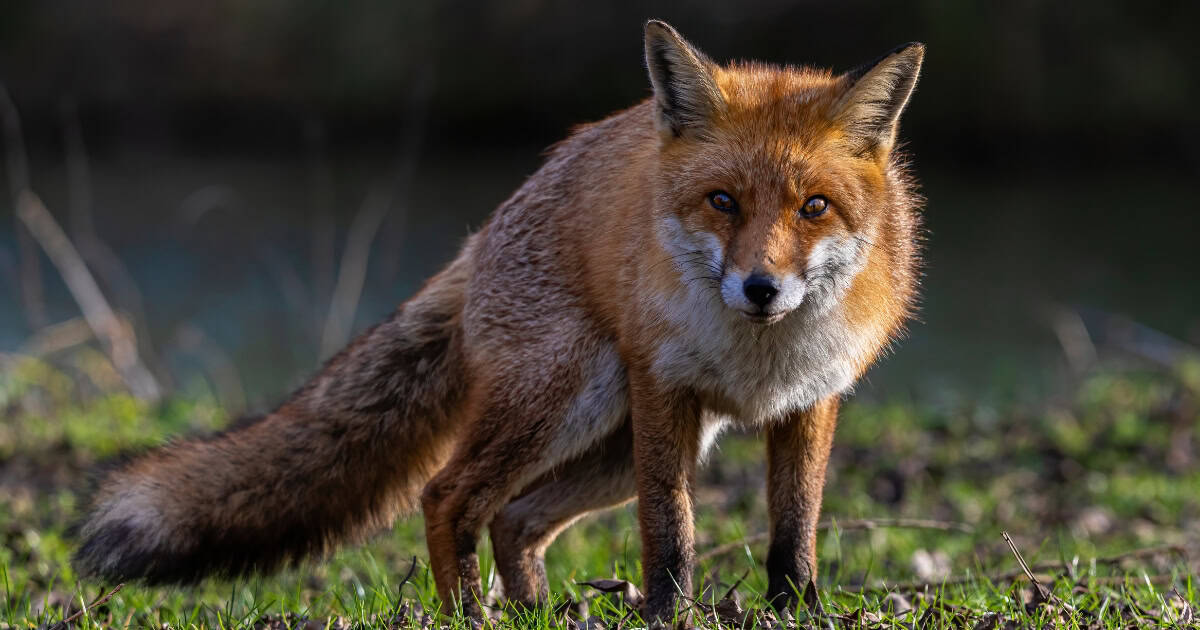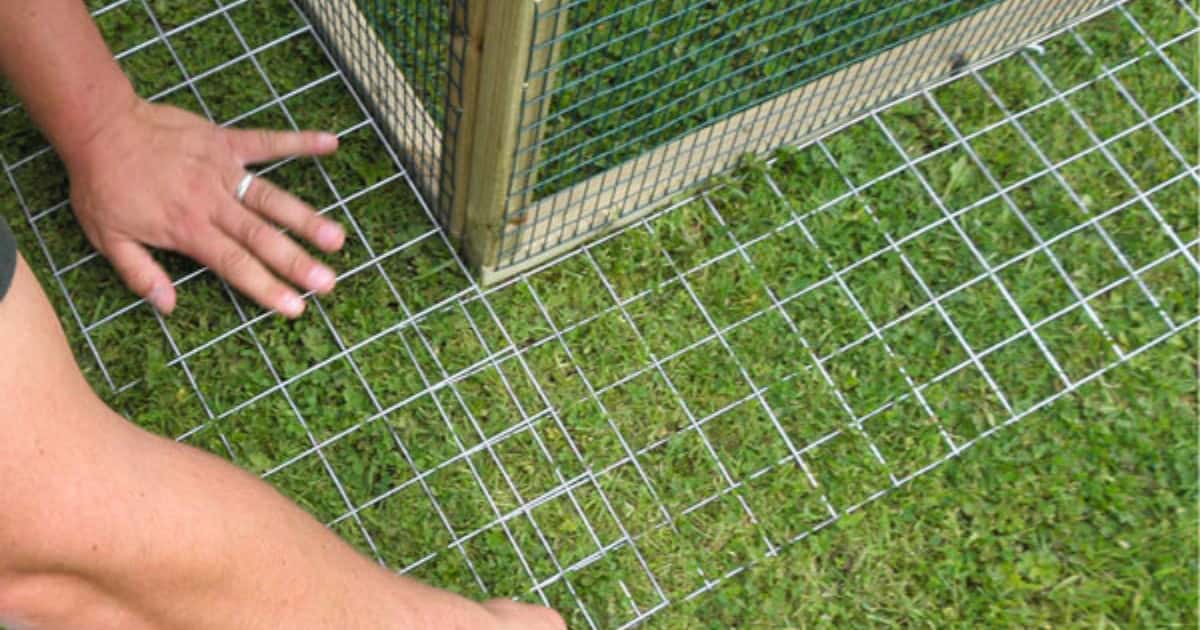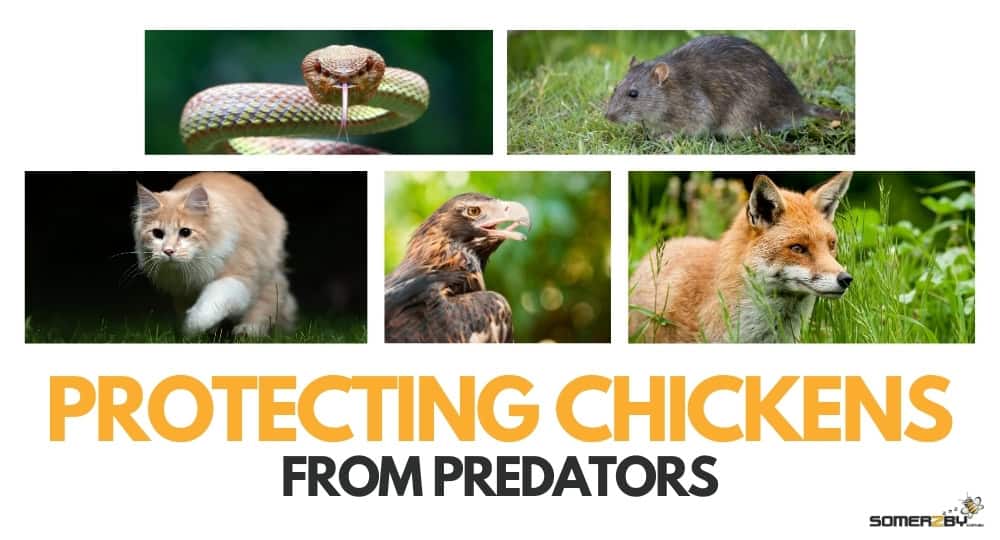There are many different predators that can harm your pet chickens. Not only can these animals kill your flock, but they can also contaminate their food or water, carry parasites, transmit disease, or scare them (which can result in lowered egg production).
Although chicken keepers can never completely remove the danger of predators, they can definitely reduce the risk with Somerzby’s tips below.
Key Takeaways
-
The main predators of backyard chickens in Australia are foxes, rodents, snakes, dogs, cats and birds of prey.
-
The more precautions you take, the safer your flock will be.
-
Effective protection includes a predator-proof coop, secure fencing and wire mesh skirting. Keeping the area clean, using motion sensors and installing electric fencing further enhance safety.
Table of Contents
Identifying Common Predators of Chickens
The first step in protecting your backyard chickens from predators is to determine which animals are a threat. Based on this, you can then choose the most appropriate measures to protect your flock.
A good way to find out about predators in your area is to ask neighbours or your local council.
Foxes
Foxes are one of the most common and persistent predators of chickens in Australia, found in both rural and urban areas. Though primarily nocturnal, adult foxes are opportunistic hunters and will strike during broad daylight if given the chance. Foxes often dig under fences, squeeze through small gaps or climb over enclosures to reach chickens.
Signs of their presence include scratch marks, burrowed holes near the coop and scattered feathers. Unlike most predators that take only one bird, fox attacks frequently kill entire flocks in a single raid, often leaving bodies behind.
Mice and Rats
Mice and rats are usually drawn to chicken coops by leftover food. These rodents can squeeze through tiny gaps in coops, burrow under walls or climb structures to access eggs and even attack vulnerable chicks. Beyond direct harm, they spread diseases such as salmonella and avian influenza, which can be fatal to poultry.
Signs of an infestation include gnawed feed bags, droppings and chewed wiring. While typically nocturnal, spotting rats during the day suggests a severe infestation requiring immediate action.
Snakes
Snakes are often drawn to chicken coops in search of rodents but can pose a direct threat to chickens as well. They enter through small gaps, under fences or slither through ventilation openings. Some venomous snakes, such as brown snakes or tiger snakes, may bite and kill adult chickens if startled or threatened.
Signs of snakes in your coop include shed skins, missing eggs and distressed chickens. Ensuring your coop is rodent-free can help reduce the risk of attracting them.
Dogs
Both domestic and wild dogs (including dingos) can pose a serious threat to chickens. While some pet dogs tolerate poultry, others have strong hunting instincts and may chase, injure or kill chickens—even during playful behaviour.
Dogs can break into coops by jumping fences, digging underneath or breaking the chicken wire off the coop’s frame.
Cats
Domestic cats typically pose little threat to adult chickens but may attack baby chicks if given the chance. They can sneak into coops through small openings or climb over enclosures to reach vulnerable birds.
Feral cats, on the other hand, are skilled hunters and will target chickens of any size, especially at night. Their sharp claws and teeth allow them to kill quickly, often leaving behind injured or missing birds.
Eagles and Hawks
Australian birds of prey, such as wedge-tailed eagles and brown goshawks, hunt chickens by swooping down from above. They target smaller or young birds, carrying them off or fatally injuring them with sharp talons.
They are found in both rural and urban areas, especially where open spaces provide clear hunting grounds.

Ways to Protect Chickens From Predators
There are many different approaches to keeping chickens safe from predators. The more methods you use, the safer your flock will be.
A Predator-Proof Enclosure
The most effective way to protect your backyard chickens is a predator-proof coop with strong chicken wire on the sides and secure latches. Always ensure the coop doors are shut overnight (including the nesting box lid) and regularly inspect for damage.
For extra protection, consider the Somerzby Deluxe Cottage or Deluxe Mansion, which includes wire mesh floors to stop digging predators from getting in underneath.
It is crucial that your coop design has a sturdy chicken run attached, to keep your chickens safe when free ranging during the daytime.
Secure the Perimeter of the Coop with Wire Mesh
Stop foxes, dogs and rats from digging into your coop by installing chicken wire around its perimeter.
One method is to dig a trench in the ground and bury the mesh vertically at least 30cm deep.
Alternatively, you can lay a wire mesh skirt flat on the ground around the coop’s edge and securely peg it down. If you have grass, it will eventually grow over the mesh, making it less visible.
Secure Your Backyard
It is important that your garden perimeter is fenced off completely. A high-quality fence will keep wild foxes and dogs off your property.
Regularly check your fence for holes or damage. Fencing must be at least 1.8 metres high with an outward-curving top to deter foxes from jumping over. We recommend that you use steel fence posts as these are harder to climb than wooden posts.
Maintain Cleanliness Around the Coop
It is crucial that you keep the area surrounding your coop clear and tidy so there are fewer places for predators to hide. Animals are less likely to approach the coop if they are out in the open and vulnerable.
Make sure the grass is mowed regularly and your compost pile is far away. Any items that could allow a predator to hide should be cleared, including rubbish and large branches.
Clean up excess chook food at the end of each day as it can attract rodents. Store all food away from the coop in an airtight container.
Collect Eggs Daily
Some predators such as rats and snakes target eggs, not your laying hens. For this reason, it is important that you collect the eggs daily to avoid attracting predators.
Check not only the nesting box but also the rest of the coop. Every now and again hens will lay in odd places!
Utilise Motion Sensors
Motion-sensor lights can be an effective deterrent for nocturnal predators, such as foxes, by startling them at night.
Motion-activated sprinklers are a useful tool for discouraging cats from approaching your chicken coop.
Provide Safety Shelters for Daytime Outdoor Protection
If your chickens are free ranging in your backyard, we recommend that you provide them with safety shelters. These allow chickens somewhere they can run into and hide from daytime predators, particularly birds of prey.
They are easy and affordable to make from old pallets or plastic drums. Get creative!
Invest in Electric Poultry Netting
Electric poultry fences are an effective way to protect your chickens from predators. The current running through electric fences deters foxes, dogs and wild cats from getting too close to your chickens, as they will receive a harmless shock if they attempt to breach the barrier.
Set Up Humane Traps
Humane traps can help catch predators, such as foxes and cats. However, keep in mind that these will only catch one at a time so you should always be using these in conjunction with other methods.
For baiting these traps, raw chicken or tinned tuna are highly effective food sources. Strategically place small amounts of these baits leading up to the trap to lure the predator in.

FAQ
Do possums eat chickens?
Native animals such as possums are not typically a direct threat to adult birds, but they may scavenge eggs if they can gain access to the coop.
How to tell which predator killed your chicken?
To identify the predator, look for signs. Foxes tend to leave dead birds behind, snakes may leave puncture wounds and dogs may have dug holes next to the coop to try to gain entry.
If you are unsure, try setting up a wildlife motion sensor camera.
What are the most common predators of backyard chickens?
The most common predators of backyard chickens in Australia are foxes, rodents, snakes, dogs, cats and other birds such as hawks and eagles.
These animals may target chickens, eggs or both, depending on the species.
How can I tell if a predator has been near my chicken coop?
Look for signs such as scattered feathers, broken fencing, gnawed feed bags and droppings. If any of your chickens are missing or injured, or if eggs are gone, it’s also a strong indication that predators have been near your coop.
Toni’s Wrap
Protecting your chickens from predators is essential for their safety and well-being. As a chicken owner myself, I know how important it is to have a secure coop, strong fencing and extra precautions like motion sensors or electric fencing. With the right setup and regular maintenance, you can keep your flock safe and give yourself peace of mind.




